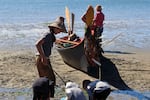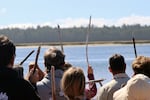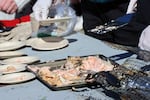This story originally appeared on Underscore Native News.
Hundreds gathered at Bullard’s Beach in Bandon, Oregon, where the Coquille River runs into the Pacific Ocean, on June 28. People came from all over the country for the 35th annual First Salmon Ceremony as part of the Coquille Indian Tribe Restoration Celebration. The sun warmed the sand as citizens of the Coquille Indian Tribe gathered driftwood sticks for the salmon ceremony.

Zade Futch, 12-year-old citizen of the Coquille Indian Tribe, stands in his cedar woven hat with three other young Coquille citizens. The young boys play on the beach following the Coquille Indian Tribe's 35th Annual First Salmon Ceremony on June 28, 2024.
Nika Bartoo-Smith / Underscore Native News/ICT
As Justin Futch and his 12-year-old son Zade prepared to offer the bones of the ceremonial salmon into the Coquille River, the crowd on the beach began to sing and bang their sticks together, creating a sound like the patter of raindrops hitting a wooden roof. The smell of smudge mingled with fading smoke from the embers of the beach fire used to cook the salmon.
“What we do today is give thanks to our cousins for what they do for our survival,” said Jason Younker, Chief of the Coquille Indian Nation, as he shared about the importance of the first salmon ceremony.

Over a hundred gathered at Bullards Beach in Bandon, Oregon on June 28, 2024 for the 35th Annual First Salmon Ceremony during the Coquille Indian Tribe’s Restoration Celebration. As the bones of the ceremonial salmon were returned to the Coquille River, people sang in prayer and raised driftwood sticks to the sky.
Nika Bartoo-Smith / Underscore Native News/ICT
This year marked 35 years since citizens of the Coquille Indian Tribe fought for and successfully passed the Coquille Restoration Act in 1989. This act restored the legal obligations between the Coquille and the federal government after Congress passed the Western Oregon Termination Act in 1954, which ended the federal government’s trust responsibilities with Coquille and 60 other Native nations in what is now Oregon. Without federal recognition, each of these nations lost the land agreements for reservation lands, hunting and fishing rights, access to healthcare and more that were made in each of the treaties that were never ratified or broken through termination.
Over the next two decades following termination, eight nations regained their federal recognition, though some consist of several bands and tribes who came together under one name to fight for restoration: the Confederated Tribes of Siltez Indians in 1977; the Cow Creek Band of the Umpqua Tribe in 1982; the Confederated Tribes of Grand Ronde in 1983; the Confederated Tribes of Coos, Lower Umpqua and Siuslaw Indians in 1984; the Klamath Tribes in 1986; and the Coquille Indian Tribe in 1989.

During the First Salmon Ceremony on June 28, 2024, citizens of the Coquille Indian Tribe prepared the ceremonial salmon to share with everyone gathered on Bullards Beach in Bandon, Oregon before returning the bones back to the Coquille River.
Nika Bartoo-Smith / Underscore Native News/ICT
Since Coquille’s restoration the nation has been able to provide services to its nearly 2,000 citizens, including education, health care and elder care. Coquille citizens have also been working to restore important cultural practices such as first foods gathering and language classes.

During the First Foods Feast on June 29, 2024 as part of the 35th Annual Restoration Celebration, Coquille citizens and community members were invited to try dozens of dishes with foods such as sea beans, octopus, smelt, fish eggs, salmon and more.
Nika Bartoo-Smith / Underscore Native News/ICT
The day after the first salmon ceremony, the Coquille Indian Tribe hosted a first foods feast. Plates were heaping with seafood, and many Coquille citizens, including those who aided in the fight for restoration, were honored with necklaces and blankets.
“My family members suffered 35 years of termination, and now we’re [celebrating] 35 years of restoration,” said Chairwoman Brenda Meade.

Brenda Meade was 18-years-old when the federal government passed the Coquille Restoration Act in 1989. For the past 13 years, she has served her nation as chairwoman for the Coquille Indian Tribe.
Nika Bartoo-Smith / Underscore Native News/ICT
‘What about me?’
Like Meade, Judy Rocha remembers the termination year. In 1954, 9-year-old Rocha was sitting at the kitchen table while her mother, Evelyn Moore, was reading the newspaper and exclaimed, “But what about me?” The federal government declared the Coquille Indian Tribe to be “terminated.”
As a young girl, Moore was sent to Chemawa Indian School. Though she told Rocha and her other three daughters that she enjoyed her time there — working on yearbook and the newspaper — Rocha knew that the experience of her mom’s cousins had been devastating, and her mother’s own experience likely was as well.
“They were still taught not to be Native,” Rocha said. “It wasn’t fair to her to be brainwashed into thinking it wasn’t safe to be Native.”
Rocha remembers getting a call from her mother in the mid-1970s about the U.S. census.
“She said, ‘Judy, I put down that I was American Indian,’” Rocha said. “It was a big deal for her, and it was a big deal for me.”
Growing up in Fortuna, California, Rocha always knew that she and her three sisters were part of the Coquille Indian Tribe. After termination, she struggled to understand what that meant and doubted that restoration would ever occur. But she said she always had a vision of working with her nation.

From left Coquille Indian Tribe citizens, Joyce Blake, Jean Moore and Judy Rocha sit on a bench outside The Mill Casino Hotel in North Bend, Oregon. The three sisters gathered with their families the last weekend in June to celebrate the 35th Annual Restoration Celebration for the Coquille Indian Tribe.
Nika Bartoo-Smith / Underscore Native News/ICT
In 1989, Rocha celebrated restoration with other Coquille citizens and has not missed a single restoration celebration since.
“It was an amazing feeling to have our tribe come together knowing our future,” Rocha said. “Just knowing that, at the very least, we would be celebrating every year, and we would be together. We would be acknowledged.”
Celebrating restoration in Moore’s lifetime meant a lot to Rocha. She watched her mother reconnect with her own Native identity and Moore got to witness her future generations grow up connected to culture before Moore passed on in 2011.

Hundreds gathered at the Coquille Reservation on June 29, 2024 for a first foods feast in recognition of the 35th Annual Restoration Celebration for the Coquille Indian Tribe.
Nika Bartoo-Smith / Underscore Native News/ICT
In 1993, Rocha fulfilled her dream of working for the Coquille Indian Tribe. She served on various committees and as the second education coordinator from 2003 to 2009, a particularly important role for her because her mom instilled in Rocha and her sisters the importance of an education.
“I was really pumped to go work for my tribe,” Rocha said. “My vision was to supplement tribal members in college.”
Rocha knew that her top priority was to help Coquille citizens afford college. Now, Rocha has many relatives who have pursued higher education thanks in large part to funding from the Coquille Indian Tribe. In June, one of her grandson’s completed his residency at a hospital in Oakland to become an oral surgeon.
‘I was proud of being an Indian’
Tom Younker was in eighth grade when the federal government announced the “termination” of the Coquille Indian Tribe. Younker grew up in Charleston, Oregon near Coos Bay.

Tom Younker, citizen of the Coquille Indian Nation, and his wife Diana Younker told stories of their young adult life together, traveling the country, during the Coquille Indian Tribe’s 35th Annual Restoration Celebration.
Nika Bartoo-Smith / Underscore Native News/ICT
“I didn’t remember the government helping us at all,” Younker said. “And my mother was constantly saying, ‘Don’t call attention to yourself,’ because it wasn’t good to be an Indian.”
But Younker says he remembers telling his mom he wanted to be just like Jim Thorpe, the first Native American to win a gold medal in the Olympics for the United States.
“I was proud of being an Indian,” Younker said.
Younker attended Linfield University on an athletic scholarship for baseball. After college he traveled around the country playing on the L.A. Dodgers minor league baseball team.
He remembers getting a check from the U.S. government in the 1950s following a court of claims decision. The decision awarded payment to citizens of Native nations whose treaties with the U.S. government were never ratified and land was taken by settlers. Younker, and others from his nation, received less than $3000 for more than 750,000 acres of forest, river and beaches of Coquille ancestral homelands in what is now southwestern Oregon. He spent his check on a Rambler station wagon.
“I spent all my Indian money on a car,” Younker said. “That was my Indian Wagon, my Rez Car.”

Citizens of the Coquille Indian Tribe prepared dozens of salmon over an open fire on June 28, 2024, to feed hundreds that had gathered in honor of the 35th Annual Restoration Celebration.
Nika Bartoo-Smith / Underscore Native News/ICT
That station wagon allowed Younker and his wife to travel around the country while he played baseball, before they settled down back in Coos County with their two sons and daughter.
Though not directly involved on the restoration committee, Younker remembers his admiration for those that fought for and helped the Coquille Indian Tribe regain federal recognition. Once restored in 1989, Younker joined the council. He served for 20 years.
“I’m thankful for the people who did work and testified,” Younker said.
‘We are a people that have always been here’
One such person is Linda Mecum. A young girl during termination, Mecum got involved with the restoration committee in the 1980s, serving as chair.
At the time, Mecum was a single mom with two teenage daughters and worked full time as a special education teacher in Salem, Oregon. Most weekends, Mecum and her two kids drove over 160 miles down to Coos Bay for hours of meetings and strategizing about the Coquille Restoration Act.
“When we were working on restoration, when we decided to try to get our federal status back, our group as a whole was focused on getting health care and education for our citizens,” Mecum said. “We didn’t really think much beyond that but we knew we wanted those services for our people. I never in my wildest dreams would have imagined that we would have what we have today.”
Mecum’s daughter, Jen Proctor Andrews, remembers doing her homework during those restoration committee meetings in the 80s, in rooms filled with loud conversations and cigarette smoke.
When the committee traveled to Washington D.C. in 1988 to testify about the Coquille Restoration Act, Proctor Andrews was 16-years-old. She remembers former Oregon State Representative Mark Hatfield, co-sponsor of the legislation, asking her why he should vote for the act.
“I feel like there is one reason and it’s education,” Proctor Andrews remembers telling him.
“Education is so important for our tribe.”

Jen Proctor Andrews, vice-chair of the Coquille Indian Tribe, stands with her mother, Linda Mecum, and 5-year-old son, Dexter. The two women have fought for restoration and cultural preservation, creating an environment in which Dexter can grow up immersed in his Coquille culture. He is one of the first kids in generations to grow up speaking his native language, Miluk.
Nika Bartoo-Smith / Underscore Native News/ICT
On June 28, 1989, the Coquille Restoration Act passed.
“It’s the recognition that we are a people that have always been here,” Mecum said, while celebrating the 35th Restoration Celebration this year surrounded by relatives and loved ones.
Vice Chair of the Coquille Indian tribe since October 2022, Proctor Andrews is continuing on her mother’s work of caring for her Native nation.
Proctor Andrews is also a strong advocate for language revitalization. She teaches Miluk, one of two languages spoken by Coquille ancestors. She is raising her five-year-old son, Dexter, to speak Miluk.
“I’m thinking he’ll probably grow up to be a tribal leader too,” Mecum said about her grandson.
Dexter’s mother and grandmother both survived termination and fought to keep Coquille culture alive and restore their nation. As a result, his generation can grow up immersed in their culture.
“He’s getting exposed to a culture that I never did, we just didn’t have it,” Mecum said. “The government did a real good job of assimilating us. And you know, we’d lost the language and without language, you don’t really have a culture.”
While Proctor Andrews’ mom had to fight for the federal government to recognize Coquille as a sovereign nation, Dexter’s mom can now work to center the needs of citizens of the Coquille Indian Tribe.
“It’s healing,” Proctor Andrews said. “I cry because he will never experience that trauma that a lot of us did.”
Underscore Native News is a nonprofit investigative newsroom committed to Indigenous-centered reporting in the Pacific Northwest. We are supported by foundations and donor contributions. Follow Underscore on Facebook, X, Instagram and TikTok.